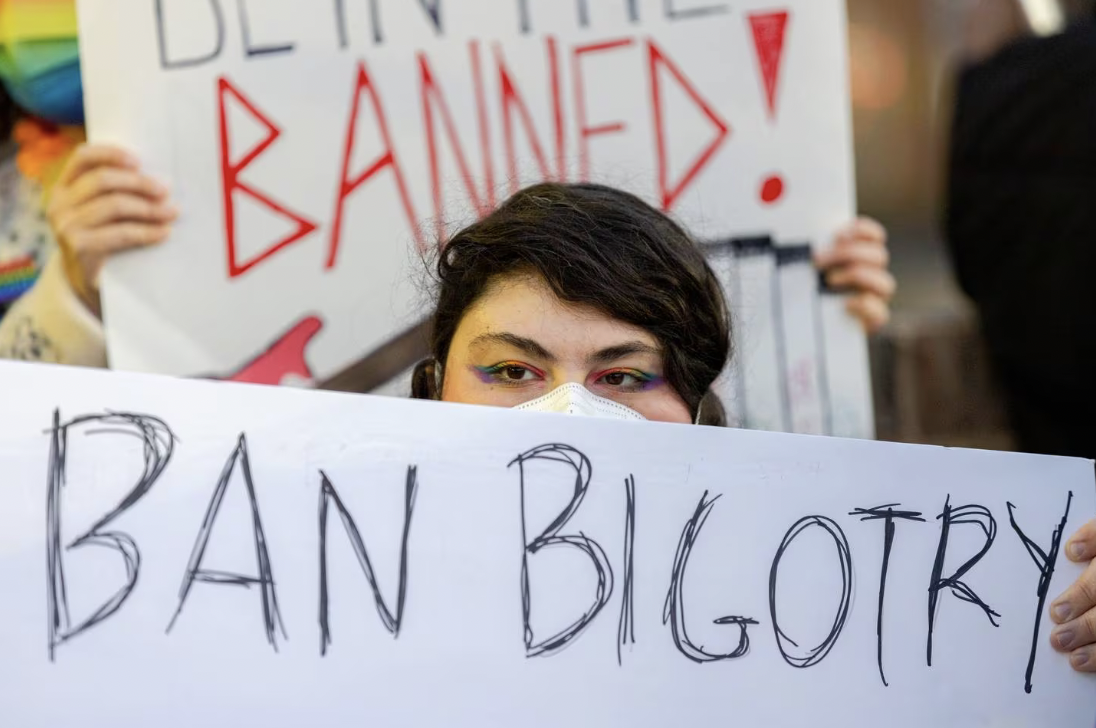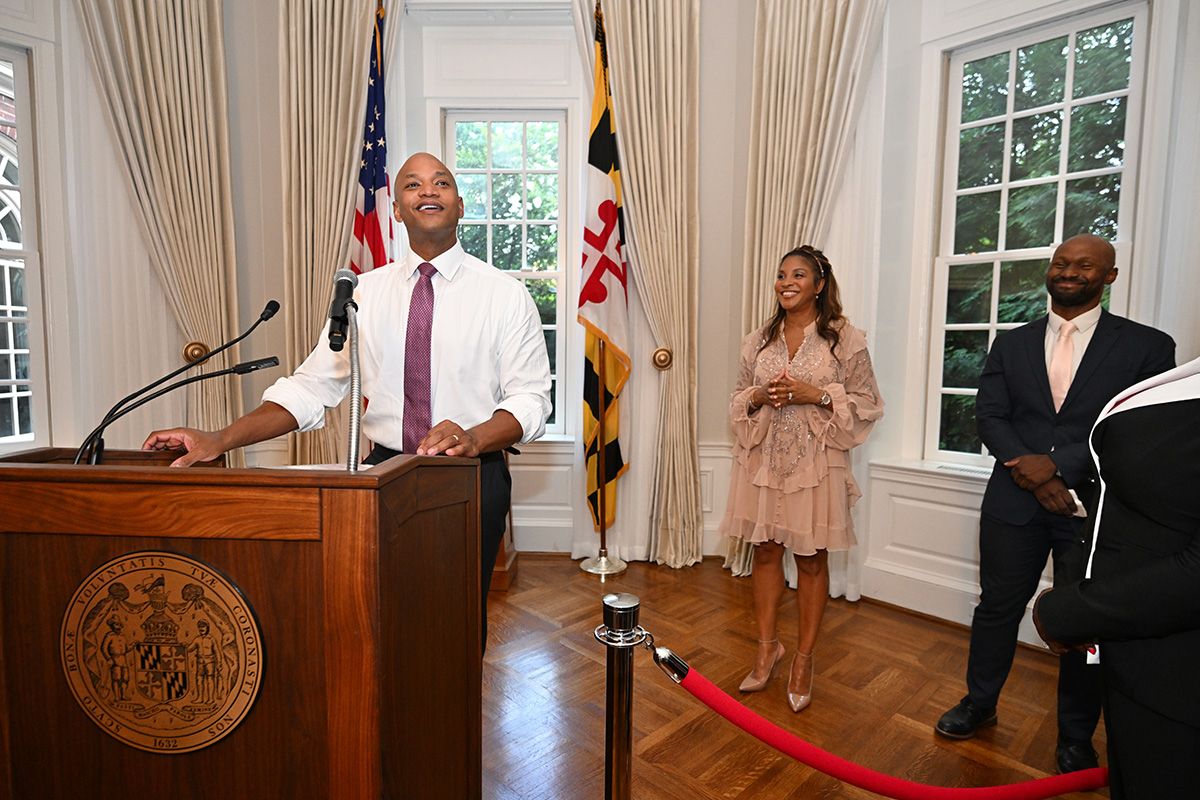Maryland
Moms for Liberty: A tale of two counties
In book ban fight, Maryland’s progressive Howard a stark contrast to neighboring Carroll

COLUMBIA, Md. — “I know there are children here,” said Jessica Garland, a little tremble to her voice. “This is my warning. There’s stuff that’s going to be said from these books. So if you want to remove your child, please do so now.” And with a deep breath, she continued. “He pushes against me, shoving the tip inside with a pop.” She paused for effect. The audience let out a few giggles and gasps of faux horror. Not a single parent removed their child from the room.
Garland was here in Howard County visiting from Carroll County, where as the chapter vice chair of Moms for Liberty, she had succeeded in pushing for the school board to ban “sexually explicit content” from school libraries. But her presentation here was attended by more mocker moms than soccer moms, fully clad in rainbow capes and Hawaiian necklaces, who had come to protest the event.
It is unlikely that the Howard chapter of Moms for Liberty will succeed in getting any books removed from schools, where none of the school board has signed the Moms for Liberty pledge to “secure parental rights at all levels of government.” The political makeup of Carroll and Howard counties is nothing alike: 60% of voters in Carroll voted for Trump in 2020, where only 26% in Howard did. Carroll County is an odd island of red in a sea of blue among the metropolitan counties of Maryland, with proximity to either Baltimore or D.C. It has a long history of right-wing proclivities, as a hotbed of KKK activity in the 20th century, and with only 59 of its 4,500 residents voting for Abraham Lincoln back in 1860.
Howard County, in contrast, seems like a queer paradise. The school system boasts a huge selection of LGBTQ programming, none of which can be found in Carroll schools: a biannual rainbow conference, LGBTQ book clubs for all age levels, Q&As for parents with queer kids, a queer literary magazine, and a Pride prom. But just because Moms for Liberty won’t succeed in replacing the school board doesn’t mean that they haven’t had any impact in Howard County.
At the Jan. 6 meeting of the school board, parents complained that their kids felt unsafe because of the recent political activity. And the school system has been pestered with numerous requests through the MPIA (Maryland Public Information Act) to report on the extent and funding of its LGBTQ programming. While the Howard County School System does employ a LGBTQIA+ Initiatives Specialist, Danielle DuPuis, they have not funded the many initiatives DuPuis has orchestrated since her hiring in 2022. DuPuis pays for the programming with fundraising through T-shirt sales, and with grants from organizations like Community Allies of Rainbow Youth. This lack of funding is a consequence of the school system’s tight budget, not of Moms for Liberty — but it is hard to imagine the school system diverting any of its limited funding to its LGBTQ programming with Moms for Liberty breathing down their neck.
This programming is important precisely because Howard County schools are not a queer paradise. On March 9, I attended one of Howard’s newer offerings: a Q&A for parents of queer students. The stories they told were shocking. Two parents described a Rainbow Fun Run that was held at Clarksville Middle School to raise money for queer youth. Students were encouraged to wear rainbow colored clothes for the event — but a dozen of the middle schoolers showed up in black from head to toe, wearing pins that said “There Are Only Two Genders.” It was refreshing to see the group react with humor. “Black is one of the colors of the rainbow,” one said. “You’re still participating anyway!”
Jessica insisted at the Moms for Liberty meeting that they were not trying to target LGBTQ books. “We did not target homosexuals, transsexuals [sic],” she said. It was clear the protesters in the audience did not believe her from the signs they carried: “Protect Trans Youth,” “Hate and Ignorance are Not Family Values,” “Ban Bigots Not Books.” They have good reason to distrust the intentions of Moms for Liberty. The Capital News Service conducted an analysis of the books Moms for Liberty targeted for removal in Carroll County, and concluded that a disproportionate number of those books were written by queer authors on queer subject matters.
But even if the quest to ban sexually explicit material from school libraries is in bad faith, the Moms for Liberty are right about one thing: The books they are targeting are sexually explicit. No protester at the event argued that the books weren’t sexually explicit, and yet no one defended the presence of sexually explicit books in schools, either. Perhaps this is not so surprising. Who wants to be seen arguing that schools should carry pornographic books? It’s far easier to defend LGBTQ books, and giggle at the spectacle of dirty words on a PowerPoint.
Unfortunately, the research on adolescents and pornography has a long way to go. In a highly cited meta-analysis of more than 100 articles on the subject published between 1995 and 2015, Jochen Peter and Patti M. Valkenburg were able to conclude very little. The literature points to an association between adolescent pornography use and both casual sex and sexual violence (both as victim and perpetrator). But the articles suffer from numerous biases. For one, they do not discriminate the content of the pornography: videos depicting consensual and non-consensual sex are lumped in together. There is a huge heteronormativity bias: queer forms of pornography have not been extensively studied. There is a negativity bias: the articles are actively looking for negative effects, not positive ones. (And all of this research has been done on internet pornography, not sexually explicit books in school libraries.)
At the end of the Moms for Liberty meeting, Nina Yukich, a fifth grade student, stayed behind to speak with Jessica. And though the library staff had already stacked up chairs for the night, I stole a seat to watch the exchange. Nina’s guardian, Dinah Yukich, had had a hostile encounter with Jessica during the Q&A portion of the event. Jessica called on Dinah as the “gentleman back there,” and Dinah accused her of “willfully and intentionally” misgendering her.
Jessica leaned down as she spoke with Nina, who stood clutching her copy of “Gender Queer,” one of the most common targets for book bans in schools. “Who do you want to talk to about this stuff?” Jessica asked. “Do you feel comfortable talking to teachers? And if this is your trusted adult — if you don’t have a trusted adult, or a friend, or a mom, or can write a letter to somebody — if you don’t have anybody to talk to […] you shouldn’t be alone reading that book.” I couldn’t believe my ears. Here was Jessica, not so subtly impugning Dinah as an untrustworthy adult. I was fully prepared for another hostile exchange.
But Dinah just stood by, observing. At no point did she interrupt Jessica, or start arguing on Nina’s behalf. It occurred to me that Dinah was letting Nina have an independent experience of the event. Dinah and Nina could obviously confer afterwards — it wasn’t as though Dinah was abdicating her role as guardian. But in letting Nina experience the night on her own, Dinah was giving the two of them something to genuinely confer about.
Dinah’s approach seems to me a model of the kind of parenting at stake in this debate over books. Do we let kids engage with sexually explicit material on their own, trusting them to confer with adults afterwards? Or do we need to be there all the while, ripping out any pages we don’t want them to see?
CJ Higgins is a postdoctoral fellow with the Alexander Grass Humanities Institute at Johns Hopkins University.
Maryland
LGBTQ suicide prevention hotline option is going away. Here’s where else to go in Md.
Changes will take effect July 17

By ANNA RUBENSTEIN | The national suicide prevention hotline will no longer offer specialized support to LGBTQ people, starting July 17, the Trump administration announced last week.
Dialing the hotline at 988 will still be available for crisis support. But callers will no longer be able to reach specific LGBTQ services by pressing Option 3. The change worries advocates because their data shows the LGBTQ community has a disproportionally high suicide rate.
Even after the option ends, here’s how to receive tailored support if you’re in Maryland.
The rest of this article can be found on the Baltimore Banner’s website.
Maryland
Silver Spring holds annual Pride In The Plaza
‘Today means inclusion. It means to build resilience’

Silver Spring’s annual Pride in the Plaza event took place on Sunday to celebrate the LGBTQ community and emphasize inclusion and resilience.
“Today means inclusion. It means to build resilience, love,” Robyn Woods, program and outreach director for Live In Your Truth, which organized the event, said. “I mean, just being surrounded by the community and so many great entrepreneurs, business owners, and just being a part of this whole rainbow coalition that we call the LGBTQIA to be about.”
With the event being her first time organizing for Live In Your Truth, Woods said she felt emotional to see the support and love at the event.
“Some people (are) bringing out their children, their babies, their grandparents,” Woods said. “It’s a lot more allies here than anything else. That type of support to me means so much more than just support from my community; just outside support, inside support, so much support around it, so much love. Everyone’s smiling outside, helping each other.”
Attendees of the event were able to head over to the Family Fun Zone, an air-conditioned Pride Cool Down Lounge, or watch live drag performances in the main stage area.
Along with entertainment and a shaved-ice stand, rows of information tables stood along the plaza, including FreeState Justice, the Washington Spirit, Trans Maryland, Moco Pride Center, and the Heartwood Program, an organization that offers support, therapy, education, and resources to the LGBTQ community.
“I want people to know about our services, and I love what we have to offer,” Jessica Simon, psychotherapist for Heartwood Program’s Gender Wellness Clinic, said. “I (also) want to be part of a celebration with the community, and so it feels good to be here with other people who have something they want to give to the community.”
She added that within today’s political climate, to which she called an “antidote to shame,” it’s important to be celebrating Pride.
“There’s a lot of demonization of LGBTQI people,” Siena Iacuvazzi, facilitator for Maryland Trans Unity, said. “(Pride) is part of the healing process.”
Iacuvazzi said she was taught to be ashamed of who she was growing up, but being a part of a community helped her flourish in the future.
“I was taught how to hate myself. I was taught that I was an abomination to God,” she said. “But being a community is like understanding that there are people who have experienced the same thing, and they’re flourishing. They’re flourishing because they’re willing to stand up for themselves as human beings and discover themselves and understand what’s true for themselves.”
She added that Pride allows for a mutual understanding to take place.
“It’s more of a sense of belonging … and just taking that home and understanding you’re not alone,” Iacuvazzi said. “We’re each taking our own journey — we’re not putting that on each other. It’s just walking away with a sense of belonging and humanity.”
Similar to Iacuvazzi, Woods said she hopes attendees’ biggest takeaways would be family, fun, resilience, and pride.
“Being proud of yourself, being happy for who you are, and representation and how much it matters,” she continued. “And I think all these young people that are walking around here get to see versions of themselves, but older. They get to see so many different lesbian, gay, bisexual, pansexual people that are successful, that are showing love, that care, and it’s not how we’re portrayed in the media. It’s lovely to see it out here. (It’s) like we’re one big old, happy family.”
Maryland
Wes Moore hosts annual Pride reception
‘Nobody should have to justify their own humanity in Maryland’

Maryland Gov. Wes Moore on Wednesday hosted his annual Pride month reception at Government House in Annapolis.
“One of the things that makes me so proud to be the governor of the great state of Maryland is that we are a safe haven for the LGBTQIA+ community,” Moore. “And I want to be clear that is a reputation we intend to keep.”
Organizations like FreeState Justice and the New Wave Singers of Baltimore gathered in attendance as speakers, including Moore, Maryland first lady Dawn Moore and FreeState Justice Executive Director Philip Westry spoke to the crowd of around 175 people.
In his speech, Moore acknowledged the accomplishments made with organizations and individuals within the audience, including passing the Trans Health Equity Act within his first 100 days in office.
A month after his first 100 days in office, Moore emphasized how an executive order protecting gender-affirming care in Maryland was signed, as well as more recent initiatives to decriminalize HIV and promote best practices in HIV prevention and care.
“But I want to be clear: we cannot — and will not — stop fighting. We must stand up and protect all of our fellow Americans — lesbian, gay, bisexual, transgender, queer, intersex, asexual … all identities,” Moore said. “Because what we are seeing out of this new White House is the latest chapter in a long playbook of demonizing specific groups for political gain. It isn’t just cruel and immoral — it also masks the humanity of our fellow Marylanders. Nobody should have to justify their own humanity in Maryland. So we are going to fight.”
-

 U.S. Supreme Court2 days ago
U.S. Supreme Court2 days agoSupreme Court to consider bans on trans athletes in school sports
-

 Out & About2 days ago
Out & About2 days agoCelebrate the Fourth of July the gay way!
-

 Virginia2 days ago
Virginia2 days agoVa. court allows conversion therapy despite law banning it
-

 New York5 days ago
New York5 days agoTwo teens shot steps from Stonewall Inn after NYC Pride parade











